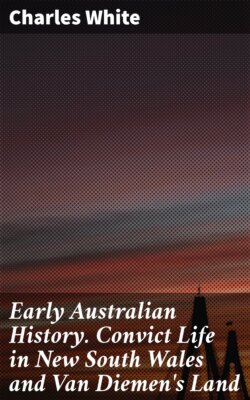Читать книгу Early Australian History. Convict Life in New South Wales and Van Diemen's Land - Charles White - Страница 3
На сайте Литреса книга снята с продажи.
INTRODUCTORY.
ОглавлениеTable of Contents
How strangely the links fit in! Little did the British Government think when issuing the orders in Council in 1786 for establishing a Convict Settlement in New South Wales, that they were taking the initial steps towards founding a "New Britannia in the Southern World." Yet so it was. If the American War of Independence had not closed the plantations of Virginia against the reception of transported offenders, and cast upon the British Government the duty of fixing upon some other place to which they might send some of the prisoners who then filled the gaols of Great Britain to overflowing, the wonderful land of which Captain Cook had spoken as having been discovered by him, and concerning which the interest of the English people had been considerably excited at the time his narratives-were published—the land which now ranks as one of the richest, most populous, and most progressive of the British dependencies—might to this day have remained in the possession of the aborigines; producing nothing, promising nothing; locked up from civilization and all its blessings (and curses), and unknown save to the few thousands of blacks who might from year to year inhabit it. And what, then, would the world have lost—what, then, should we who live in it have lost?
Pessimists, time and again, have raised a lachrymose wail about the 'stain' which must always rest on the colony through the criminality of its early life; but these men can never see anything but the evil, and even that evil they would intensify for the sake of making their wailing more mournful. 'Tis true that the beginning was in some measure bad, but that bad beginning was better than no beginning at all; and, fresh from long and deep research among old records, I am bold to declare that the earlier convicts were not the worst criminals who came out to the colony, and that some of the darker and bloodier stains which deface the first pages of the colony's history were made by men who counted the poor chained wretches under them as worse than the offal in a charnel-house—men who came out free, who lived freely, lied and robbed and murdered freely, and who literally fattened on the blood of other mortals a thousand times better than themselves, although those mortals had been banished from their fatherland in chains. The facts in proof of this assertion will appear in proper order; at present we must deal with events that transpired before either bond or free from Britain's shores placed foot upon Australian land for the purpose of making it their home.
Great Britain had had experience of transport colonization before ever Australia was thought of. For upwards of a century and a half, historians tell us, great numbers of convicts were annually sent across the Atlantic to American plantations, most of them being sold to the planters for a term of years or for life, and from this source, for a considerable period, England is said to have derived a revenue as large at times as £40,000 a year, the convicts being sold to the planters at an average of £20 each. But here, also, out of evil good arose. Virginia, one of England's earliest and most successful attempts at colonization, is a remarkable instance of prosperity outflowing from beginnings of the darkest moral shade. In the case of Australia, the conditions were different, but the elements were the same, and now that the old order has changed, giving place to the new, we, from the midst of the free, beneficent and flourishing institutions now existing—from surroundings of the most favorable character—from conditions of private, social and public life of which any nation might be proud—look out upon the fast-fading picture of the past, and marvel exceedingly at the change.
"Read me anything but history," said Walpole; "that is sure to be false." And a good many in Australia living at the present day would give not a little of their possessions to be able to create a general distaste for and hatred of colonial history, and to induce those who cared to read that history to believe that it was false. They fear the record because of its truth, and because they have reason to know that in this case "truth is stranger than fiction." And I purpose giving only such facts, in this somewhat irregular narrative, as can be vouched for either by living witnesses or by written (some very badly written) official records. The reader can, of course, if he choose, keep in view the maxim of Epicharmus—"Be discreet, and bethink thee to be mistrustful, to disbelieve rather than otherwise;" but neither doubt nor distrust on the reader's part will render less true the records—some of which are written in ineffaceable letters of blood.
